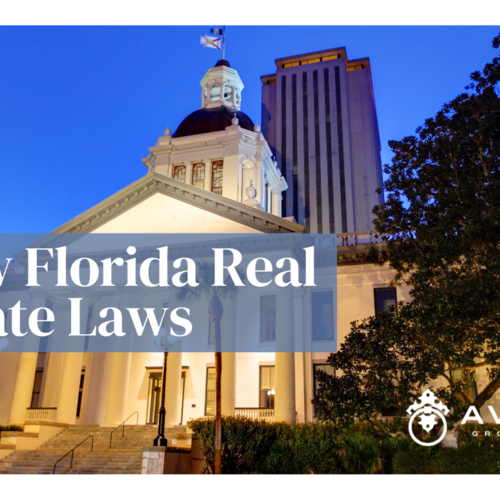Is Florida’s Real Estate Market Crashing? Florida’s Housing Market: Navigating the Currents of Change
As a seasoned realtor with Avalon Group Realty in St. Petersburg, FL, I’ve witnessed numerous shifts in our local housing market. However, the current landscape presents a unique set of challenges and opportunities that warrant a closer look. In this report, I’ll break down the key factors influencing Florida’s real estate market and offer insights on how buyers and sellers can navigate these changing tides.
Is Florida’s Real Estate Market Crashing? The Cooling of a Once-Hot Market
Florida’s real estate market, long known for its sizzling appeal to both homebuyers and investors, is showing signs of cooling off. This shift has caught the attention of major players in the financial world, with investment firms like Raymond James and Citigroup recently downgrading their outlook for homebuilders heavily invested in the Florida market.
Aaron Hunt, Broker of Avalon Group Realty, offers his perspective on this trend: “While we’re seeing a slowdown compared to the frenzy of recent years, it’s important to remember that Florida’s market has always been cyclical. What we’re experiencing now is more of a return to normalcy rather than a crash.”
Indeed, this cooling trend is the result of several converging factors that are reshaping the landscape of Florida real estate.
Rising Costs: Insurance and Property Taxes
One of the most significant challenges facing the Florida housing market is the sharp increase in homeowners insurance premiums. These skyrocketing costs are putting a squeeze on affordability for many Floridians, both current homeowners and prospective buyers.
Furthermore, property taxes have also been on the rise in many areas of the state. The combination of these two factors is causing some homeowners to reconsider their position in the market.
Yvette Kim, a fellow realtor at Avalon Group Realty, shares her observations: “We’re seeing more clients factoring in these increased costs when making decisions about buying or selling. It’s crucial for buyers to carefully consider the total cost of ownership, not just the purchase price.”
Inventory Surge and Market Dynamics
Another key factor influencing the market is the significant increase in available inventory. According to data from Redfin, the number of homes for sale in Florida has jumped by an impressive 40% year-over-year, with new listings up 12.5%.
This surge in inventory can be attributed to several factors. Firstly, some homeowners, concerned about rising interest rates, are choosing to sell now rather than risk further increases. Additionally, Florida has seen a boom in new home construction in recent years, adding to the supply of available properties.
The result of this inventory increase is a softening of prices in some areas and a rise in what the industry refers to as “stale” listings – properties that have been on the market for over 30 days without finding a buyer.
Pam Amante, another experienced realtor, notes: “The increase in inventory is definitely giving buyers more options, but it’s also creating challenges for sellers. Properties need to be priced competitively and presented well to stand out in this market.”
Interest Rates and Market Hesitation
The impact of interest rates on the housing market cannot be overstated. The recent period of rising rates has created a sense of uncertainty among both buyers and sellers.
Many potential buyers are hesitant to commit to purchases at current rates, hoping for a decrease in the near future. On the other hand, sellers who locked in low rates on their current homes are reluctant to sell and potentially face higher rates on a new purchase.
However, there is some optimism on the horizon. According to projections from the National Association of Realtors (NAR), we may see interest rates start to decline in 2024. NAR’s chief economist, Lawrence Yun, predicts that the average rate on a 30-year fixed-rate loan could drop to 6.3% by the end of the year.
Is Florida’s Real Estate Market Crashing? Navigating the New Landscape: Advice for Buyers and Sellers
Given these market conditions, how should buyers and sellers approach their real estate goals in Florida? Here are some key considerations:
For Buyers:
- Take advantage of increased inventory: With more properties on the market, buyers have more options and potentially more room for negotiation.
- Factor in all costs: Be sure to consider insurance premiums and property taxes when calculating affordability.
- Stay prepared: Get a strong pre-approval from a reputable lender to remain competitive in the market.
For Sellers:
- Price strategically: With more competition, it’s crucial to price your property competitively from the start.
- Enhance appeal: Consider strategic renovations or improvements to make your property stand out.
- Be patient: Be prepared for potentially longer marketing times in this changing market.
Aaron Hunt advises: “Whether buying or selling, working with a knowledgeable local realtor is more important than ever. We can provide up-to-date market analyses and guide you through the complexities of this evolving landscape.”
Looking Ahead: Florida’s Resilient Market
While the current market conditions present challenges, it’s important to maintain perspective. Florida’s housing market has a long history of resilience and continues to be an attractive destination for homebuyers and investors alike.
Yvette Kim reminds us: “Florida’s appeal goes beyond just the housing market. Our beautiful weather, diverse communities, and no state income tax continue to draw people from all over the country.”
Moreover, the potential for interest rate decreases in the coming year could reinvigorate the market. Even a 1% drop in rates could bring more buyers and sellers back into the market, potentially sparking renewed activity.
Opportunity Amidst Change
In conclusion, while Florida’s housing market is undoubtedly in a period of transition, this change brings both challenges and opportunities. For buyers, the increased inventory and potential for rate decreases offer the chance to find great properties potentially at more favorable terms. Sellers, while facing more competition, can still achieve their goals with the right strategy and expert guidance.
As Pam Amante aptly puts it: “In real estate, change is constant. The key is to stay informed, work with experienced professionals, and be ready to adapt your strategy as the market evolves.”
At Avalon Group Realty, we’re committed to helping our clients navigate these changing tides. Whether you’re looking to buy your dream home in the Sunshine State or sell your current property, our team of experienced realtors is here to guide you every step of the way.
Remember, the Florida housing market, while currently experiencing a slowdown, remains a complex and dynamic system. By staying informed, working with knowledgeable professionals, and approaching the market with a clear strategy, you can successfully achieve your real estate goals in this evolving landscape.
Is Florida’s Real Estate Market Crashing? Market Trends and Future Projections
As we delve deeper into the nuances of Florida’s real estate market, it’s crucial to examine current trends and consider future projections. This analysis will help both buyers and sellers make informed decisions in the coming months.
Median Home Prices: A Closer Look
Recent data from Ramsey Solutions reveals interesting trends in Florida’s housing prices. Comparing the fourth quarters of 2022 and 2023, we see a modest increase in median sales prices:
- Q4 2022: $401,990
- Q4 2023: $410,000
This 2% increase, while not as dramatic as in previous years, indicates that Florida’s market is still experiencing growth, albeit at a more sustainable pace.
Regional Variations: Not All Markets Are Equal
It’s important to note that Florida’s real estate market isn’t monolithic. Different regions and cities within the state are experiencing varying trends:
- Orlando, Tampa, and Jacksonville: These cities have seen median listing prices above $412,000, surpassing the state’s overall median sales price.
- Coastal areas: Some coastal regions continue to command premium prices due to their desirable locations.
- Rural areas: Certain rural parts of Florida may offer more affordable options for buyers looking to escape urban centers.
Aaron Hunt of Avalon Group Realty emphasizes this point: “We always remind our clients that real estate is fundamentally local. While statewide trends are important, understanding the specific dynamics of your target neighborhood is crucial.”
The Inventory Puzzle: Demand vs. Supply
One of the most significant challenges facing Florida’s housing market is the ongoing inventory shortage. Despite recent increases in listings, the state still faces a substantial deficit in available homes.
Ken H. Johnson, an associate dean at Florida Atlantic University’s College of Business, provides some sobering numbers:
- Florida needs approximately 200,000 new homes each year to keep up with demand.
- Currently, the state is only adding about one-tenth of that number annually.
This persistent shortage continues to put upward pressure on prices, even as other market factors are causing a slowdown.
The Interest Rate Conundrum
Interest rates remain a critical factor in the housing market’s health. While rates have risen significantly over the past couple of years, there’s cautious optimism about potential decreases in 2024.
Current projections suggest:
- The average 30-year fixed-rate loan could drop from around 7.5% to 6.3% by year’s end.
- Even a 1% decrease could significantly impact affordability and market activity.
Yvette Kim of Avalon Group Realty notes, “We’re advising our clients to stay prepared. If rates do decrease as projected, we could see a surge in market activity.”
Navigating Market Uncertainty
Given these complex and sometimes conflicting market forces, how should individuals approach their real estate decisions in Florida?
For Buyers:
- Stay informed but don’t try to time the market perfectly.
- Focus on your long-term goals and financial readiness.
- Consider the total cost of ownership, including potential insurance and tax increases.
For Sellers:
- Understand that the days of bidding wars and instant sales may be behind us for now.
- Focus on presenting your property in its best light to stand out in a more competitive market.
- Be flexible and open to negotiation.
Pam Amante advises, “In this market, both buyers and sellers need to approach transactions with realistic expectations and a willingness to compromise.”
Conclusion: Opportunity in Every Market
While Florida’s real estate market is undoubtedly facing challenges, it’s important to remember that opportunities exist in every market condition. By staying informed, working with experienced professionals, and maintaining a clear focus on your goals, you can successfully navigate these changing tides.
As we move forward, the Florida market will continue to evolve. At Avalon Group Realty, we’re committed to providing our clients with the most up-to-date information and expert guidance to help them achieve their real estate dreams in the Sunshine State.
If you are looking for a Realtor in St Petersburg visit https://avalongrouptampabay.com/




